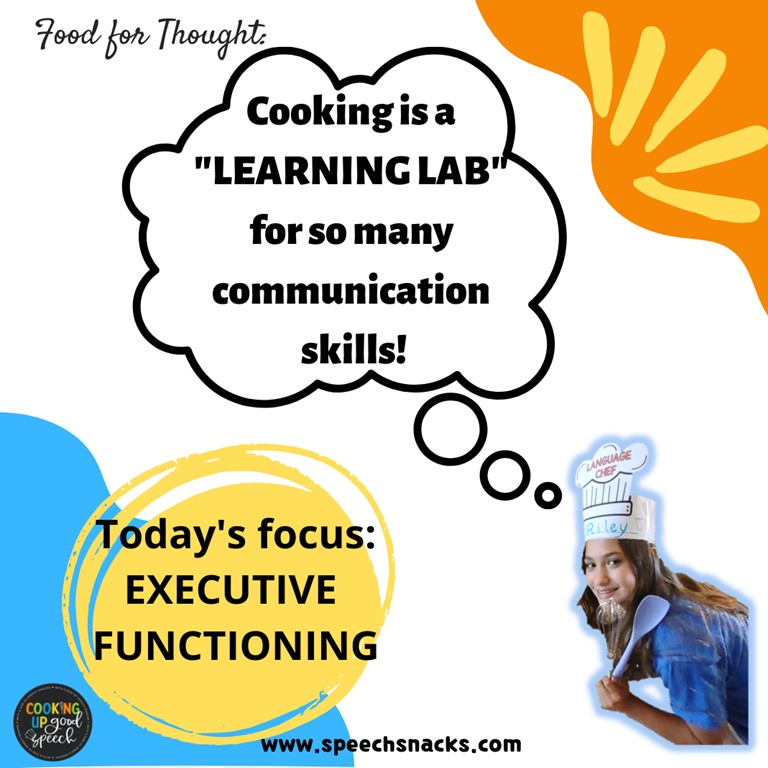
Executive functioning refers to a set of mental processes that enable individuals to plan, organize, manage time, pay attention, and make decisions effectively. Did you know that making recipes is an effective tool for improving executive functioning in children? When children engage in the process of following recipes, they encounter numerous challenges that require executive functioning skills and strategies to successfully complete the recipe steps. Measuring ingredients, sequencing steps, monitoring cooking times, and adapting to unexpected situations all demand various executive functions, which makes cooking an ideal approach for cultivating these skills!
Here are some ways in which executive functioning skills are used when children learn how to cook:
- Task Planning: Cooking requires breaking down the recipe into steps. Children need to plan and sequence these steps in the right order to successfully prepare a dish. They must consider what needs to be done first and what follows.
- Time Management: Executive functioning skills help children estimate how long each cooking step will take, enabling them to manage their time effectively.
- Organizing Ingredients and Tools: Before starting, children must gather the necessary ingredients and tools. Organizing the workspace and ensuring everything is in place improves efficiency and reduces the likelihood of making mistakes.
- Focus and Attention: While cooking, children need to pay close attention to the recipe, cooking times, and any changes in the appearance or smell of the food.
- Task Initiation: Beginning the cooking process involves overcoming any procrastination or reluctance to start the task at hand.
- Working Memory: Working memory allows children to hold information temporarily and follow multiple steps of the recipe without getting lost or forgetting key elements.
- Inhibitory Control: Children must resist the temptation to skip steps or taste ingredients before they are fully cooked, exercising self-control and patience.
- Flexibility and Adaptability: In case something goes wrong or an ingredient is missing, executive functioning skills enable children to adapt, make quick decisions, and find alternative solutions.
- Problem-Solving: When faced with challenges like adjusting seasoning or dealing with kitchen mishaps, children need to think critically and solve problems effectively.
- Self-Monitoring: Throughout the cooking process, children need to assess their progress, evaluate the taste and texture of the dish, and make adjustments as needed.
- Task Completion: Cooking a dish from start to finish requires perseverance and the ability to see a task through to completion.
So now let’s take a closer look at several EXECUTIVE FUNCTIONING skills that are required for cooking. For each area, I have listed QUESTIONS that tap into METACOGNITIVE thinking (your ability to be aware of what you are thinking about!) These questions are great STRATEGIES for guiding children while they cook while providing a foundation for strengthening EXECUTIVE FUNCTIONING SKILLS!
#1 PLANNING–
- What recipe will I make?
- When will I make it?
- What tools and ingredients will I need?
- Am I planning backward about when and how much time I need to complete each part?
#2 ORGANIZATION—
- Do I have the proper workspace to prepare the ingredients?
- Do I have the kitchen tools and ingredients readily available?
- Am I keeping my workspace clean?
- Do I have VISUALS/CHECKLISTS/POST-ITS to help me remember what I need to complete?
#3 TIME MANAGEMENT/TEMPORAL SEQUENCING–
- How much time do I need to make the recipe?
- Did I set a timer/reminder to help me remember to complete a step, keep stirring or check if an item is finished?
#4 FLEXIBILITY-–
- Am I able to adapt and adjust quickly when something doesn’t go as planned while cooking?
#5 VISUALIZING–
- Do I see a picture in my head of what the end product will look like?
- Did I read all the steps FIRST and VISUALIZE what each step looked like?
#6 SELF-MONITORING-
- Am I keeping track of the time?
- Am I attending to tasks or getting distracted?
#7 IMPULSE CONTROL-
- Am I eating all the ingredients before the recipe is done?
- Am I taking enough time or rushing to complete the tasks?
#8 WORKING MEMORY–
- Can I hold the steps in my head?
- Am I subvocalizing the directions and visualizing the details to help me remember what needs to be done next?
So the next time you step into the kitchen to prepare a meal at home, or if you are an educator thinking about making a recipe in your next classroom lesson or therapy session, remember that cooking not only teaches kids life skills but also EXECUTIVE FUNCTIONING skills –because EVERYTHING we do STARTS and ENDS with our EXECUTIVE FUNCTIONS!!
Interested in using a COOKING THEME to address communication skills in your classroom or therapy setting? LANGUAGE CHEF can help! LANGUAGE CHEF–The Ultimate Language-Based Recipe Resource allows you to use EXECUTIVE FUNCTIONING strategies by breaking down recipes into steps, providing checklists, graphic organizers, and step-by-step photo visuals. So many opportunities to practice LANGUAGE, COMMUNICATION, and EXECUTIVE FUNCTIONING!!
I can’t wait to start “Cooking Up Good Speech and Language” with you and your students!












Leave a Reply